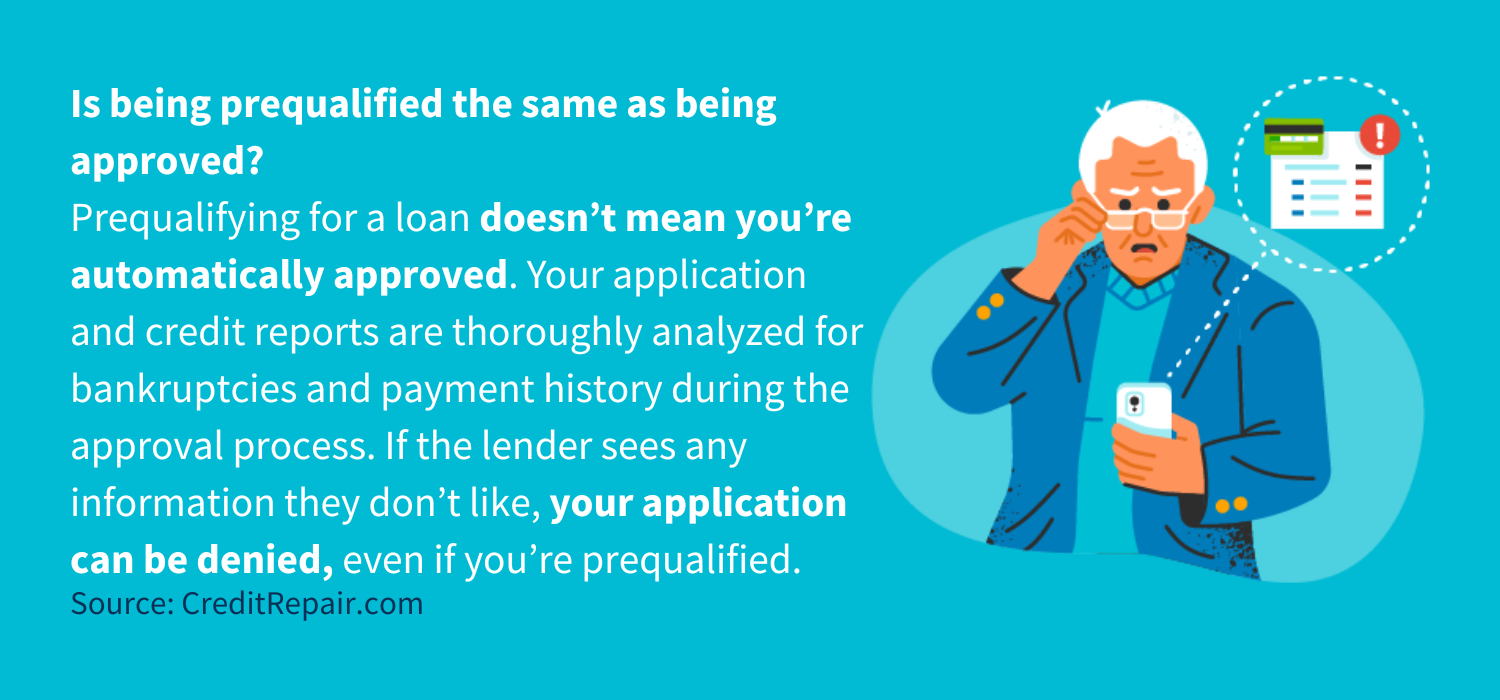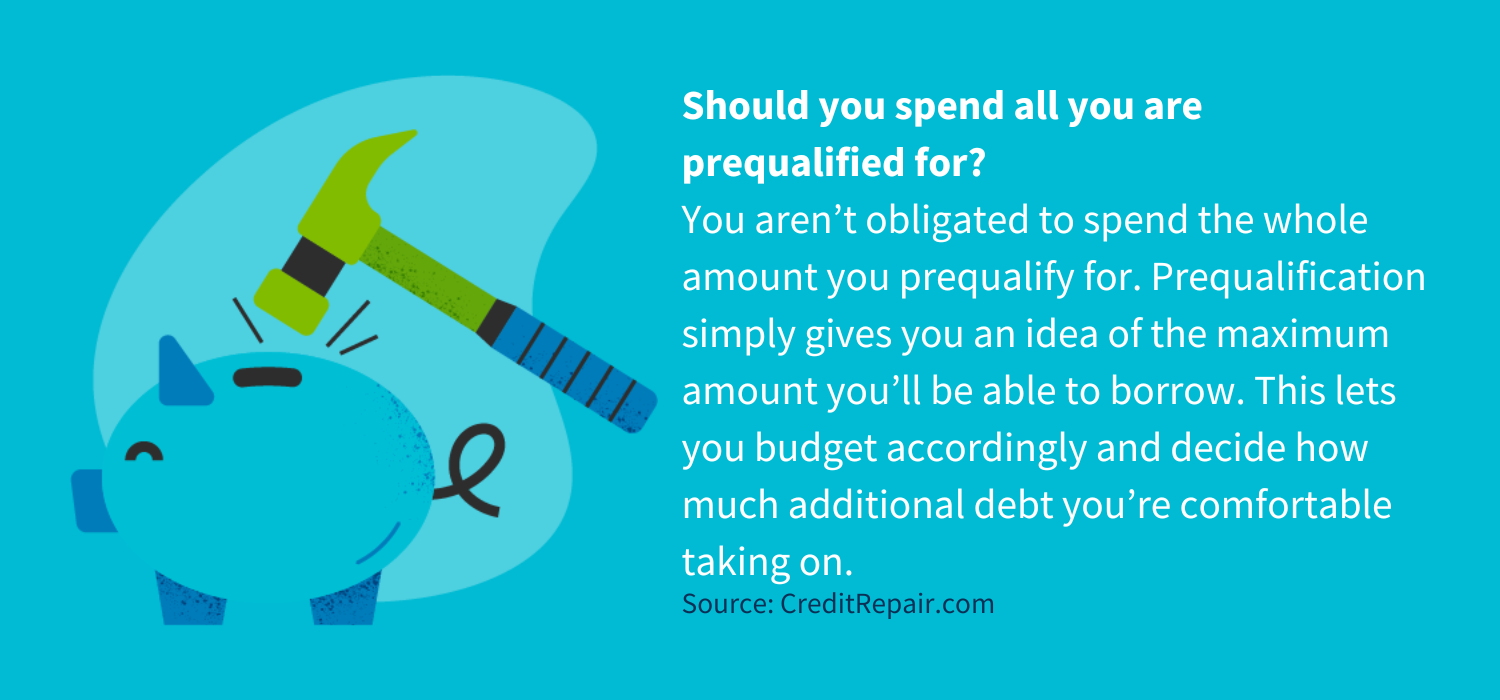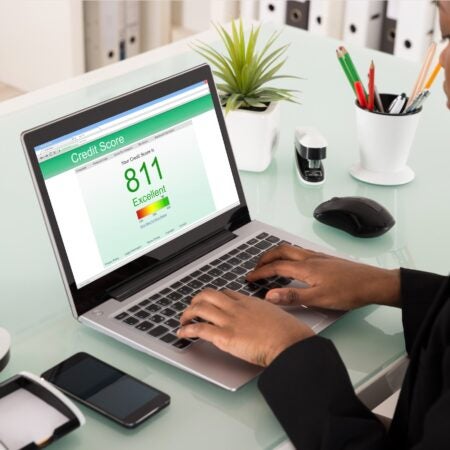
Disclosure regarding our editorial content standards.
Whether you’re considering applying for a loan or a new credit card, it’s advisable to shop around before applying to avoid getting a ding on your credit score. But you may see a little blurb on the website encouraging you to check if you prequalify.
Does prequalification affect your credit score? The simple answer is no, checking to see if you prequalify for a loan or credit card won’t harm your credit score.
Prequalification is meant to help you determine your chances of approval before spending time filling out the application. However, prequalifying for a new line of credit isn’t the same as being approved. The process is a bit more complicated than that.
Learn more about prequalification and how the process can assist you when deciding whether you want to take the plunge and apply for a new line of credit.
What is loan prequalification?
You can usually request prequalification before applying for almost any type of loan or credit card online or through a lender. The process involves a lender looking over your basic credit information, such as your credit score, to check your risk level as a candidate.
They’ll also review other key information, including your employment status, current income and debt amounts. Overall, the process takes only a few minutes. Your results are usually provided as soon as the information is submitted.
For loan prequalification, you may receive a letter in the mail directly from the lender. Otherwise, you can fill out a form online or speak with a representative from the financial institution you’re hoping to get the loan from.
How does loan prequalification work?
During loan prequalification, a lender will ask about your current financial situation, such as your income, monthly bills, how much you’re hoping to borrow and what you have for a down payment. Lenders also will want to know about your current credit score. They may ask for an estimated range or conduct a credit check with a soft inquiry.
The prequalification process doesn’t involve applying for a new line of credit. This means it won’t qualify as a hard inquiry and impact your credit score. A hard inquiry occurs when a lender pulls your full credit report from one of the three main bureaus to determine your chances of approval. Conversely, a soft inquiry happens when issuers take a brief glance at your credit information without issuing a new line of credit.
A hard inquiry typically knocks a few points from your credit score regardless of whether you’re approved for the loan. In contrast, a soft inquiry won’t impact your score.
Is being prequalified the same as being approved?

Prequalifying for a loan doesn’t mean you’re automatically approved. Your application and credit reports are thoroughly analyzed for bankruptcies and payment history during the approval process. If the lender sees any information they don’t like, your application can be denied, even if you’re prequalified.
Why should you prequalify for a loan?
Prequalifying for a loan can give you an idea of whether you have a chance of getting approved for the type of loan and amount you need. Seeking prequalification from several lenders also can help you comparison-shop for interest rates and better prepare for your future application.
Depending on the amount you prequalify for, you can establish a budget or down payment for a future loan, since you’ll have an idea of how much you’ll be able to borrow.
Can prequalification affect your credit?
Prequalification doesn’t affect your credit because it’s based on a soft credit inquiry. This type of inquiry doesn’t impact your credit score, so there’s no real risk associated with it. Once you move on to the preapproval stage, the process becomes more complicated.
Preapprovals typically require a hard credit check, which can hurt your score. However, a single hard inquiry won’t do any lasting damage.
Prequalification FAQs
When is prequalification helpful?
Prequalification can be used as a tool to see how much you realistically can borrow or get approved for. For instance, prequalification for mortgage loans can help determine what type of home you can afford. It also gives you the chance to shop around and compare loan offers before making a final decision about submitting a full application.
What to do when your application is denied
If your application is denied, you can take steps to improve your credit situation and potentially get approved in the future. For instance, you can obtain a copy of your credit report and inspect it for any errors or areas that need improvement. This may include a lack of credit history or a high debt-to-income ratio.
Asking the lender why you were denied can also help you gain insight on how to improve your situation. For instance, if the lender requires five years of employment history and you have only two and a half years, you can move on to a new lender whose requirements better align with your situation.
The difference between being prequalified vs. preapproved
Being prequalified for a loan or credit card doesn’t guarantee your application will be approved. It’s more of an estimate of what you might be approved for based on the information you provide to the lender. Preapproval is a more in-depth process that indicates the lender is ready to move ahead with your loan.
Should you spend all you are prequalified for?

You aren’t obligated to spend the whole amount you prequalify for. Prequalification simply gives you an idea of the maximum amount you’ll be able to borrow. This lets you budget accordingly and decide how much additional debt you’re comfortable taking on.
Tips to get your credit ready for a loan application
As you’re preparing to submit a new loan application, you can take steps to make sure your credit is in a good place to increase your chances of approval. Your credit report and credit score significantly impact your ability to get a loan and a low interest rate. Here’s what you can do:
- Check your credit: Keep tabs on your credit so you know where you stand and can determine if any factors are affecting it. Try to catch up on missed payments, and look for details that drastically affect it, such as accounts in collections. Fixing these issues can increase your credit and your chances of approval.
- Pay your bills on time: Getting ready to apply for a new loan can be a busy time, but don’t forget about making the payments on your current bills. Late payments can hurt your credit, especially when they first happen. Setting up automatic payments or bill alerts can help you track your bills and make sure payments are received by their due dates.
- Pay down current debt: Credit utilization is another factor that affects your credit. It measures how your revolving account balances compare to your credit limit. By paying down some of this debt, such as credit card charges, your utilization rate will lower, which means your credit score may get higher.
- Don’t open any new accounts: Refrain from opening any new credit cards or loans before applying for what you really want. Opening a new account will result in a hard inquiry and can reduce your credit score by lowering the average age of your accounts.
Prequalification is a quick and easy way to determine your eligibility for a new line of credit. This helps you understand what may affect your approval chances without getting a hard inquiry on your report. When used correctly, it’s a great way to reduce future rejections and gain insight into your credit.
If you’re worried about the state of your credit, CreditRepair.com can help you determine exactly what’s hurting your credit and the steps you can take to fix it. Take our free online credit evaluation today to see where you stand.
Note: The information provided on CreditRepair.com does not, and is not intended to, act as legal, financial or credit advice; instead, it is for general informational purposes only.
Questions about credit repair?
Chat with an expert: 1-800-255-0263






